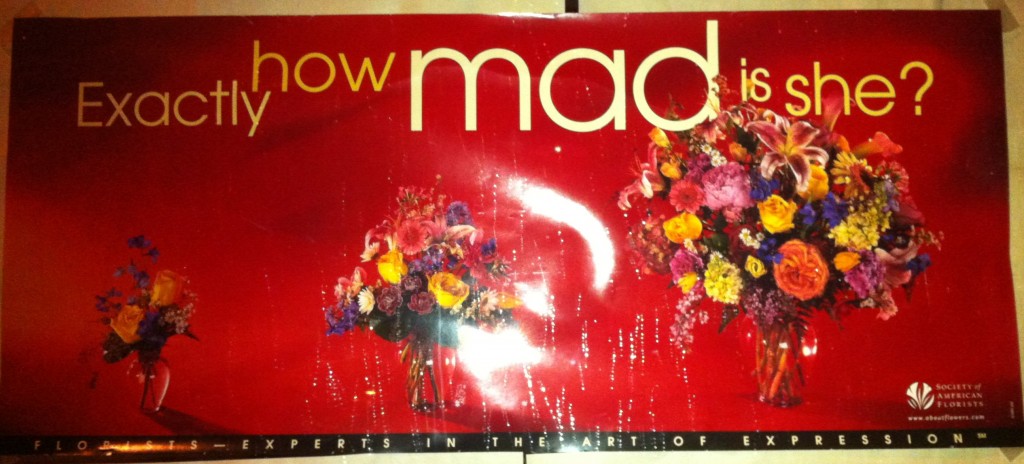In addition to selling stuff, advertising tell us something about what “normal” relationships between people look like, such as the case below, submitted by Kyra M.
What’s it saying? When a woman’s upset, you can fix it with flowers.
In equating “she’s upset” with “get her flowers,” we’re discouraged from considering whether she might have a good reason to be upset.
Women have long been considered irrational creatures (it’s one of the justifications for denying them the vote — they didn’t have sufficient reason to make good choices in government) — much like children. When a child’s upset, you don’t reason with them, or think about whether you need to change your behaviour, you assume it’s because the child is immature. This ad encourages us to treat women the same way, as if they’ve just had their feelings hurt and a little consideration and then everything will be fine. This undermines women’s status in a variety of contexts, communicating that women’s complaints do not need to be taken seriously. This kind of attitude makes women less able to structure their social environments to meet their needs.
More, this trope suggest that whatever a woman’s concerns are, she’ll abandon those positions and principles if you spend enough money. This construes women as corruptible — another construction justifying the lack of women in positions of authority. After all, would you want someone’s who’s irrational, materialistic, and corruptible running your company? Or your government?
——————————
Anastasia Kulpa teaches Sociology at Grant MacEwan University in Edmonton, Alberta, Canada. Her research interests include the sociology of post-secondary classrooms, and cultural vehicles for transmitting ideology (class, music, television, etc.).


Comments 21
<< Work at home, $45/h, link — March 3, 2012
Facts are the enemy of truth
Anonymous — March 3, 2012
Anyone who made me mad and brought me flowers as a way to assuage my anger may well find the vase on the floor by their feet. As part of a more elaborate apology, sure. Instead of a valid apology. No.
Anonymous — March 3, 2012
I like how this article defends the intellectual and emotional validity of women's perspectives by undermining those of children. Nice.
Emily B. — March 4, 2012
Not only does it paint women as immature and irrational, but it assumes that the average man is so emotionally stunted that the only way he would know how to deal with an angry partner would be to spend money on showy gifts. We should be giving both genders a bit more credit than that.
Sumgai — March 6, 2012
Flowers work. I don't know what kind of women some of you *cough* "men" are dating, but it's been my experience that flowers or really, it could be anything you imagine, is used as a token of regret - along with actually expressing regret and an apology, usually works. And quite well. The article is attempting to show some sort of disgust with an advertisement as demeaning towards women. Why? What's demeaning about it? If you don't think that, as far back as human evolution can be studied, that whenever the male pissed off the female, he didn't attempt to assuage her anger by offering her a token of appreciation? Get off the horse, it's high enough already.
naath — March 6, 2012
To be fair I do appreciate it when people bring gifts along with their apologies because I'm a sucker for a nice gift. They have to manage the apology too though, or some other mutually satisfying resolution to the problem at hand.
Not flowers though, I hate cut flowers; if you're dating me and don't know that then I don't want to be dating you anymore.
Guest — March 6, 2012
Guys, the ad was supposed to be funny. It's not actually saying that all one needs to do to appease an angry woman is buy her flowers. It's poking fun at that stereotype.
Breathe.
freddy-may — March 6, 2012
Also, of course you wouldn't just get your girlfriend flowers because she likes flowers and you like her. She must be pissed about something.
Unless the thing she is upset about is "you did not bring me any flowers," flowers are probably not the sole solution.
El síndrome pre-menstrual como única explicación para el malestar de una mujer. | Psicoloquio — December 3, 2012
[...] implicaciones de este estereotipo pueden verse en mensajes sociales como el de este anuncio, que a a entender que mientras más enojada está la mujer, más grande son las flores que su pareja [...]
El síndrome pre-menstrual como única explicación para el malestar de una mujer. — forosexy.com — December 12, 2012
[...] implicaciones de este estereotipo pueden verse en mensajes sociales como el de este anuncio, que a a entender que mientras más enojada está la mujer, más grande son las flores que su pareja [...]
Vendendo flores com sexismo « Portifa — January 30, 2013
[...] e adaptado deste post do The Society Pages Share this:TwitterFacebookLike this:LikeBe the first to like this. Categories [...]